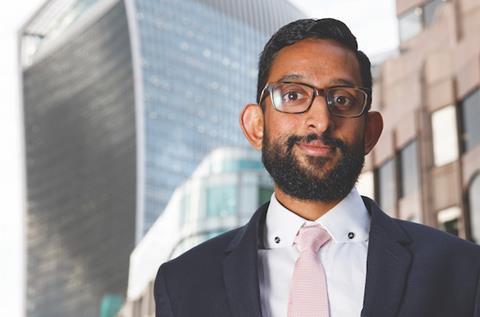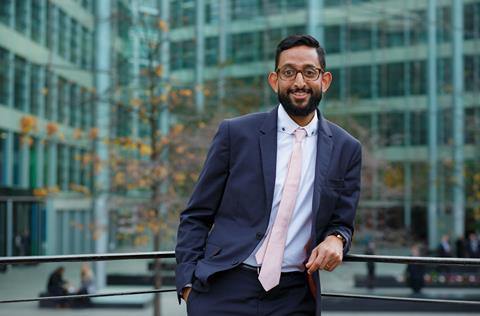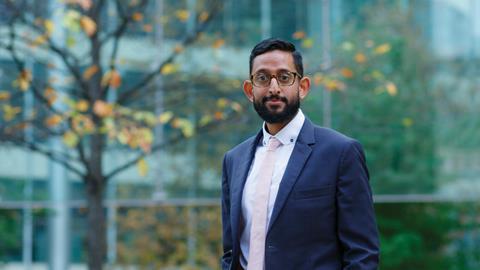An uncle who joined Gandhi’s independence movement inspired Ravi Naik to aim for a legal career, the Law Society human rights award winner tells Jonathan Rayner
BIOG
EDUCATION
University of Western England, LLB, 2003-2006; Bristol University, LLM in international law, 2007-2008
ROLES
Intern at Reprieve, 2009; work experience at human rights firm Leigh Day, 2009; intern at International Commission of Jurists, 2009-2010; ITN Solicitors, 2010-present
KNOWN FOR
Groundbreaking work on data rights; Human Rights Lawyer of the Year at the Law Society Excellence Awards 2018
Fresh from university and on his first day as an intern at a charity that campaigns against the death penalty, Ravi Naik met one of the charity’s patrons. That person was Lord Bingham, a former lord chief justice, who in a 2006 lecture had famously defined the eight principles that make up the rule of law. The lecture was a seminal moment in British legal history; and the meeting, in January 2009, was an auspicious start to Naik’s career as a human rights lawyer asserting the supremacy of the rule of law.
As an intern, paralegal and – ultimately – solicitor, Naik has handled cases where the principle that the rule of law applies to governments, institutions, companies and individuals alike is paramount. Some involved rendition, torture and the electronic tagging of would-be immigrants. But he also acted in a case where a seemingly innocuous dating agency was in the dock. Then there was the case of the animal rights activist who released captive guinea pigs into the wild and for her pains was accused of financing terrorism.
However, it is his work on technology companies’ cynical manipulation of data that brought Naik to the attention of the Law Society Excellence Awards judges. His exposure of the extent to which Cambridge Analytica was able to use people’s data to influence elections and referendums started a ‘ripple’, he says, ‘that became a tidal wave that hit Silicon Valley’. He is in no doubt that ‘untrammelled’ access to such data and the freedom to use it for whatever ends the ‘technology giants’ choose is a threat to democracy. ‘Data rights are human rights,’ he argues.
‘We have come to a point in humanity where the free flow of data is almost an ideology. We are on the lip of a precipice where data controllers have all the power… and individual citizens are only relevant because of their data.’
Naik, now almost five-years-qualified and a partner at London firm Irvine Thanvi Natas (ITN Solicitors), was inspired by his great-uncle, a UK-trained barrister. The great-uncle left this country to join Gandhi and other leaders of the Indian independence movement. ‘He took his British bar principles to India,’ Naik says, ‘to advocate for equality, self-determination and justice. The rule of law applied internationally.’
This same great-uncle gave the then 12-year-old Naik a copy of The Law as Literature: An anthology of great writing in and about the law, edited by lawyer and writer Louis Blom-Cooper and published in 1961, saying simply: ‘This is what the law can do.’ The message stayed with him, Naik confides, and ‘from then on, I had no other aspiration than to become a lawyer’.
We are on the lip of a precipice where data controllers have all the power… and individual citizens are only relevant because of their data
After an LLB and LLM (in international law), he became an intern at Reprieve in January 2009. Reprieve, a charity founded in 1999 by lawyer Clive Stafford Smith, provides free legal support to prisoners on death row and also to victims of abusive state counter-terror policies, such as rendition, torture, and extrajudicial imprisonment and killing. States deemed complicit in these policies include the UK, US, Saudi Arabia, Pakistan and Bahrain.
Naik first worked on researching how music and ‘white noise’ can be used for psychological torture before joining the renditions team, where he says he ‘looked at flight patterns and repatriation from Guantanamo Bay’. It was during this time that he worked with Stafford Smith on the high-profile case of Binyam Mohamed, an Ethiopian national and UK resident who was released from Guantanamo Bay – without charge – after almost seven years’ detention without trial. Mohamed claimed in court that British officials participated in his torture and illegal rendition from Afghanistan to a secret camp in Morocco and from there to Guantanamo Bay. The UK government, without conceding guilt, eventually granted him undisclosed damages.
‘I was at the “Yin and Yang” of what was happening in the war against terror,’ Naik says. ‘On the one hand, there was the urgent humanitarian need to counter terrorist activities. On the other, there was the rule of law, with its prohibition against torture and the right to a fair trial.’
Naik’s career next took him to a month’s work experience at London and Manchester human rights firm Leigh Day; and then to another internship, this time at human rights non-governmental organisation the International Commission of Jurists (ICJ). While at the ICJ he telephoned ITN partner Tayab Ali for help with a case he was researching. Ali, who heads ITN’s diplomatic, political and international law team, offered him a paralegal position, which Naik accepted. He progressed from paralegal to trainee solicitor, completed a part-time legal practice course, was admitted in January 2014 and joined the partnership in 2017. Then just last month he was named Human Rights Lawyer of the Year 2018 at the Law Society Excellence Awards.
How does he explain his meteoric rise? ‘Tayab gave me some inspirational advice,’ Naik recalls. ‘He said that if a problem feels morally wrong, then there should be a legal answer. And if there isn’t already a legal answer, find one.’
His work at ITN reads like a catalogue of recent, high-profile human rights cases. He collaborated with a Turkish law firm, for example, on the 31 May 2010 Mavi Marmara flotilla killings. Turkish activists sailing to deliver humanitarian aid to the beleaguered people of Gaza were boarded by Israeli commandos who, it is alleged, immediately opened fire on the unarmed crew, killing 10 of them. One activist was shot four times in the head, others received fatal wounds to their backs. Video footage provided by the Israelis stopped just before the shooting began.

POINT OF PRINCIPLE
Naik undertook two cases that followed a misjudgement by Theresa May when she was home secretary.
In the second, Raed Salah, leader of Israel’s Islamic Movement, a body that has a legal basis in that country, was detained in June 2011 upon coming to the UK on what was supposed to have been a 10-day lecture tour. Instead, he stayed for 10 months while he fought Home Office moves to deport him back to Israel on the grounds that his presence in the UK was not conducive to the public good.
In April 2012, the Upper Immigration Tribunal allowed his appeal against deportation, ruling that May’s decision to deport him was ‘entirely unnecessary’ and that she had been ‘misled’.
Later in the same month, Salah voluntarily returned to Israel, which was what he had intended all along. He says: ‘I fought not just for my own sake, but for all who are smeared because they support the Palestinian cause.’
Naik comments: ‘The United Nations Human Rights Council issued a report in which it condemned the use of firepower as disproportionate, saying that it betrayed an unacceptable level of brutality.’
Israel, on the other hand, rejected the UN report as ‘biased and one-sided’. Normal diplomatic relations between Turkey and Israel resumed in June 2016, with the latter promising millions of pounds in compensation to the families of the deceased.
Another case, this time holding the UK government to account, concerned the many hundreds of would-be immigrants upon whom the Home Office (under the leadership of then-home secretary Theresa May) had imposed curfew orders of up to 12 hours a day. ‘These people were not criminals,’ Naik stresses, ‘but were effectively detained because of their immigration status. The Court of Appeal ruled that there was no legal basis for the curfews and the detainees were able to recover their liberty and be reunited with their families.’
You have the power to tell the state that you have human rights, but there is no existing mechanism for telling the technological giants the same thing
Was this not a waste of public money? Naik shakes his head. ‘It’s what human rights are all about – justice, fairness, the rule of law. It’s about using the law to give ordinary people a voice.’ He pauses: ‘I would love to work myself out of a job.’
We come at last to the jewel in Naik’s crown: his groundbreaking work on data rights. ‘Data protection and the way people’s lives are affected by the misuse of their data is an issue of fundamental human rights,’ he says. ‘And it is a new issue because you are not talking about state actors anymore, but about technological giants.’
He explains: ‘You have the power to tell the state that you have human rights, but there is no existing mechanism for telling the technological giants the same thing. Citizen activism is beginning to have an impact, with individuals demanding to see the data held on them and what it is being used for. Human rights lawyers are increasingly going to be part of that dynamic.’
Data, Naik adds, ‘can have an impact on power, money and love – the fundamentals of the human narrative’.

Where power is the object, he cites the Cambridge Analytica scandal. Data, harvested from Facebook and other digital sources, is alleged to have been used to influence the UK’s Brexit referendum and Donald Trump’s presidential election in the US. Naik acted for US citizen David Carroll in applying British data protection laws to find out how his personal data had been used – in the US – by a British company to create his data profile and, potentially, support Trump’s election campaign.
‘In the US,’ Naik explains, ‘Americans have virtually no rights over their data. But in this country, the data protection framework makes it immaterial where the people are. What really matters is where the data is processed. In this instance, it was processed in the UK and therefore the UK Information Commissioner was empowered to demand access to that data. If Cambridge Analytica or its parent company, elections contractor SCL, with which it shares staff, directors and a London office, fails to comply, it can be subject to criminal proceedings.’ Cambridge Analytica, which has ceased trading, has said it was the subject of ‘unfounded accusations’. The Information Commissioner’s investigation is ongoing.
How does data have the potential to affect your wealth, your money? Naik points to Thomson Reuters’ World Check database which, the company states, is an ‘early warning system for hidden risk’ associated with major charities, activists and mainstream religious institutions. It identifies individuals with connections to terrorism and dishonesty, but sometimes gets it wrong.
One such mistake concerned an animal rights activist who released guinea pigs from captivity before they could be used for medical experiments. ‘Inexplicably, she was classed by World Check as a terrorism financing risk,’ Naik says. ‘This not only put her in danger of retribution from vigilantes and others, but it also had consequences for her credit score and access to financial services.’
Another victim of misidentification was Naik’s client Azzam Tamimi, a British-Palestinian journalist and academic. In 2004/05, he had been helping the British government, police and MI5 to reclaim control of Finsbury Park mosque which, in his words, had been hijacked by ‘hardliners’ and ‘extremist thugs’. For his pains, he was rewarded with the disturbing experience of seeing his and his wife’s bank accounts repeatedly shut with no explanation. He had been profiled on World Check as an ‘alleged suicide bombings advocate and extremist’.
Finally, what possible impact can data have on your love life? Naik talks about the ‘slightly tragi-comic’ experience of journalist Judith Duportail, who decided to find out exactly what data the Tinder dating app held on her. She sought Naik’s help in requesting the data, but as she disclosed in a September 2017 article in the Guardian, ‘the 800 pages of information on me (was) way more than I had bargained for.’
Those pages contained details of her education, the age range of men she was interested in, how many Facebook friends she had, and when and where every online conversation happened with each match. ‘What if the data was stolen?’ she asked. ‘What will happen if this treasure trove of data gets hacked, is made public or simply bought by another company? I can almost feel the shame I would experience. The thought that, before sending me these 800 pages, someone at Tinder might have read them already makes me cringe.’
Naik concludes: ‘The threat to human rights posed by the abuse of data is only getting bigger and broader. Facebook has just been fined £500,000 by the Information Commissioner, but how will the likes of Facebook and Google react to individual claims? Facebook chief executive Mark Zuckerberg says that his company respects data protection, but will he walk the walk as well as talk the talk?’
What solution does Naik propose? ‘I’d love to see an international framework for data protection. Data pirates are always seeking jurisdictions that give them the freest rein. They should be reminded that data rights are human rights and that this is not the wild west – their power is limited and human rights, like data, crosses international borders.’

































No comments yet